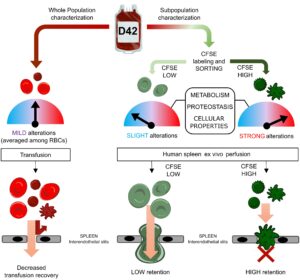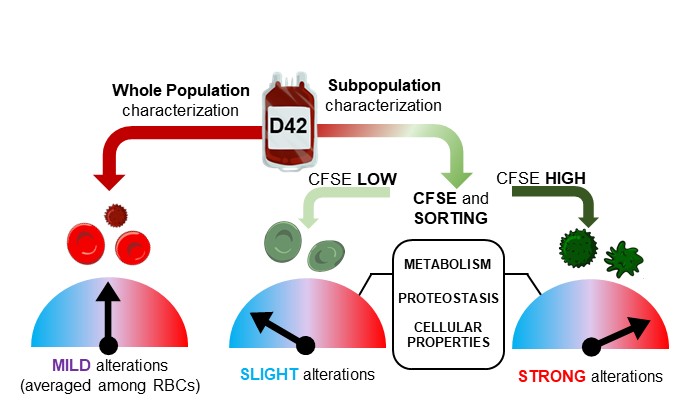NEWS
Read our latest publication in The Journal of Clinical Investigation!
Proteostasis and metabolic dysfunction characterize a subset of storage-induced senescent erythrocytes targeted for posttransfusion clearance.

Permanent availability of red blood cells (RBCs) for transfusion depends on refrigerated storage for up to 42 days. During this period, RBC properties are progressively altered, causing decreased transfusion efficacy. These storage lesions are usually evaluated at the whole population level. Using a staining protocol that specifically sorts morphologically-altered and normal RBC subsets, we reveal subset-specific biological networks overwhelmed by metabolic and oxidative stresses during storage that lead to their splenic clearance after transfusion. This study supports the concept that the storage lesion does not affect all RBCs equally and identifies proteostasis as a crucial pathway in their storage quality.
Contact: pascal.amireault@inserm.fr
Link to the article: https://www.jci.org/articles/view/183099
contact : pascal.amireault@inserm.fr

Array
Proteostasis and metabolic dysfunction characterize a subset of storage-induced senescent erythrocytes targeted for posttransfusion clearance.
J Clin Invest, 2025, vol.135, p.
Sandy Peltier, Mickaël Marin, Monika Dzieciatkowska, Michaël Dussiot, Micaela Kalani Roy, Johanna Bruce, Louise Leblanc, Youcef Hadjou, Sonia Georgeault, Aurélie Fricot, Camille Roussel, Daniel Stephenson, Madeleine Casimir, Abdoulaye Sissoko, François Paye, Safi Dokmak, Papa Alioune Ndour, Philippe Roingeard, Emilie-Fleur Gautier, Steven L Spitalnik, Olivier Hermine, Pierre A Buffet, Angelo D’Alessandro, Pascal Amireault
